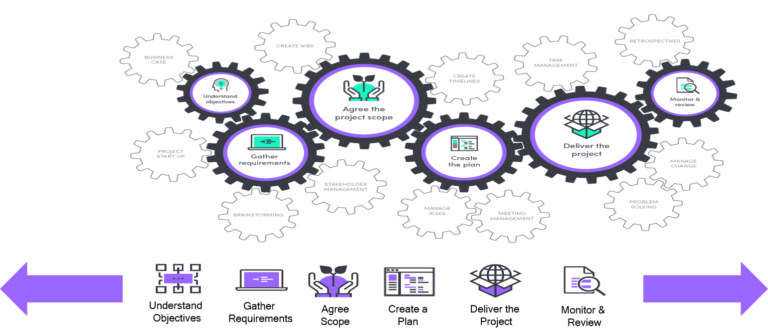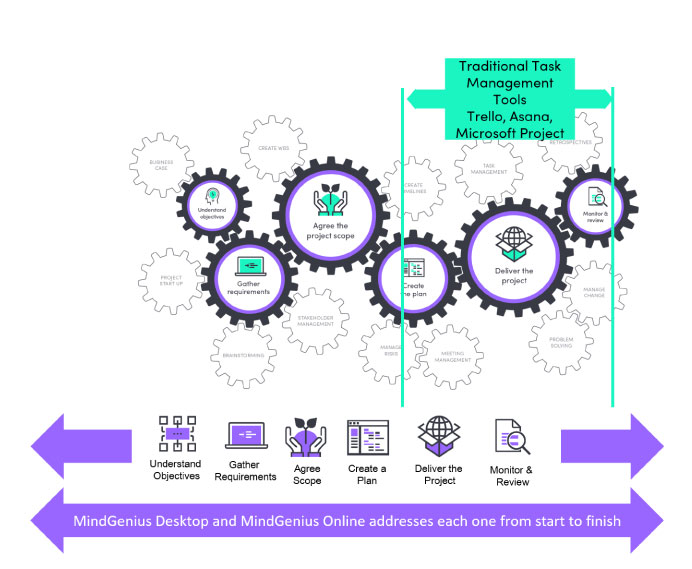About Us
About us
MindGenius is a company based in Scotland specializing in Mind Mapping and Project Management software.
MindGenius business was spun out of Gael Ltd in 2008 to focus exclusively on visual mapping tools. Since then, we have grown to have customers in over 100 countries across the world. In 2017, we launched our own SaaS product, MindGenius Online, a browser-based software tool to accompany and used in conjuction with our desktop software, with the latest desktop version being called MindGenius 20, which celebrated 20 years since the launched of the first MindGenius Software.
Our Purpose
We want to provide an easy and complete product. Wther you are doing complete projects or carrying out simple Mind Maps.
Using visually connected information and knowledge, we want to make it easier to take correct decisions, plan the best way to proceed and manage resultant actions and resources through to completion.
We also want to provide a platform that is suitable for all users. We have been a long-standing member of the Dyslexic community, gaining approval by the British Dyslexia Association in 2019, while also being listed as an assistive technology for hundreds of schools, universities and colleges throughout the United Kingdom.
Mindmapping
MindGenius is a mindset and a way of working that enables individuals and teams to work, communicate and collaborate efficiently and effectively. It uses the principles of Mind Mapping in a working environment.
Mind Maps were originally championed by Tony Buzan to assist in learning and studying. Mind Maps are developed around a core subject from which radiates branches, keywords, images and pictures that capture information and knowledge in a layout that by default reinforces relationships, association and links relating to the topic.
In education, this technique helps visual thinkers, making it easier to retain, recall and use information on a certain subject. For example, you recall an image and then remember the associated keywords used to capture information and knowledge about the subject. Then, you are more able to recall relevant links and relationships having previously created and drawn them via a Mind Map.
It has also been shown that Mind Map techniques provide a very effective coping mechanism for students who are dyslexic and is heavily used in Learning Support departments in Universities and Further Education establishments.
Our Product
Mind Mapping is used extensively in the businesses we have run, however there was one significant difference in how these Mind Mapping techniques were used day to day – little use of pictures and images. In a business environment, the challenge is more often to capture the collective knowledge and experience within an organization to help overcome the specific business challenge.
However, there was little or no emphasis on pictures or images in that process, and with that came the realization that the technique was being used to pull information from our collective brains. Data, knowledge and experience was provided quickly and informally giving almost instant access to what was and was not, known. Images in those situations were only a distraction and were not used.
However, this amplified the visual nature of branches, keywords, associations, relationships and links which helped ignite discussions and quickly bottom out what was and was not known.
Maps provide clarity and it becomes far easier to spot what information or knowledge is incomplete or missing. Therefore, this avoids any issues further into the process. Those maps invariably became the focal point of what needed done and individuals and groups were invariably being assigned actions to progress what needed to be done.
Through time, Mind Maps have taken over all types of communications within companies and eradicated the need for formal reporting. No longer a need to spent time on grammar, sentence structure and spelling. No longer a need to read and re-read in depth reports. Meetings became more focused, shorter and less frequent. Everything was done from a map.
Based on the success of the technique internally an in-house mapping tool was developed to find ways to quickly transform from map to plan to action stage; and MindGenius was born.
Our Product
The MindGenius product has continued to evolve. We are now at MindGenius 20 having gone through 9 major changes. Today it encourages the use of simple Project Management disciplines without getting overwhelmed by formal techniques. The mapping component continues to be a core value to us.
In 2015, it was recognized that there had been a significant shift in technologies and in the expectations of users. Whilst it had been the norm to have desktop applications tied to Windows or Apple, there was now more demand for access irrespective of the type of device you are using.
The MindGenius architecture would prove too difficult to port, so a decision was taken to create a brand-new platform that would build on what had been achieved so far with a new MindGenius Online product released in July 2017, providing access irrespective of device, platform or browser.
Key Business Challenges to Overcome
The Business Problem our products overcome is:
-
Of all the projects that fail
-
37% are due to inaccurate requirements gathering (Ref 1)
-
41% are due to changes in scope mid-project (Ref 2)
This is because
-
the right people weren’t involved from the start
-
The project requirements were poorly defined and managed
The Impact of the Problem
-
The business loses money
-
Projects run late, over budget or fail to deliver expected benefits
-
Projects get cancelled having chewed through $, time and energy
-
Resources tied up
-
Firefighting and unable to contribute elsewhere
-
Compromise the end result
-
To control budget and timescale the only option is to cut back on scope
-
Expected returns don’t materialise
Our Solutions mitigate the impact of the problem because they
-
Focus on the Front End of a Project
-
What is the problem / missed opportunity?
-
What currently works?
-
What doesn’t?
-
What could be achieved?
-
Is it aligned to organisational strategy?
-
Who needs to be involved / consulted / on-board?
-
Are constraints defined?
-
Are risks and assumptions identified, mitigated and managed to a comfortable level?
-
Identify and communicate what this project isn’t!

The Project Management Lifecycle
There are 6 key stages to effective Project Management:
- Understanding Objectives
- Gathering Requirements
- Agreeing Scope
- Creating a Delivery Plan
- Delivering the Project
- Monitoring & reviewing Progress
Each stage has other demands as shown by the less dominant cogs in the diagram at the top of the page:
- Business Case Alignment, Project Start-Up
- Agreement, Brainstorming, Work Breakdown Structures
- Stakeholder, Risk & Meeting Management
- Task Management, Problem Solving, Change Management
- Retrospectives
The Value of Our Solutions
Our products, MindGenius Online and MindGenius Desktop provide the ability to:
- Clarify what needs to be delivered
- Plan how and when
- Deliver successful projects
And the capability to help
- An organisation understand itself and how it is performing
- Make the right strategic decisions
- Simplify complex processes and situations
- Maintain alignment with strategic objectives
- Gain consensus on best way forward
- Eliminate unwanted surprises during project delivery
The Marketplace Our Products Fit In
- There are many competitive Project Management solutions in the marketplace
- They range from simple low-cost solutions to complex and expensive solutions managing huge projects
- MindGenius Online is optimised to support team of 10 or less to deliver multiple projects simultaneously in a team environment where online collaboration and sharing of plans is required
- MindGenius Desktop is a standalone Desktop solution ideal for teams but where the key documents are maintained and controlled by a single project manager
Why?
- Large projects are typically broken down into smaller projects
- Smaller projects are typically delivered by teams of 8-10 people
- The Project Management solutions for managing large projects are typically too complex and too expensive for the teams delivering the multiple small projects that collectively are the project

Key Product Differentiation of MindGenius Online and MindGenius 20
The principle reasons projects fail is due to inadequate management of objectives, requirements and scope. The leading tools in the PM space ignore this front end and typically pick up projects at planning the delivery stage and by then the damage is done!
Existing PM Tools ignore the front end and manage from Create the Plan forward. To try our products download a free trial today of MindGenius Desktop by clicking on link or for MindGenius Online sign up for a trial and join our thousands of users who have benefited from our approach to helping teams deliver successful projects

